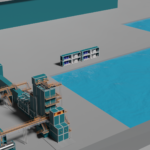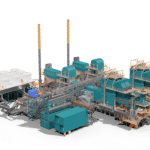For the residents of Rosario, Argentina, good solid waste management means more than just a clean city. Rosario’s approach to garbage has improved the economy and environment with, according to the city’s mayor, “a direct impact on what matters most: the quality of life of urban residents.”
“We’ve tried to be one step ahead, taking on the challenge to innovate while looking for solutions,” said Rosario Mayor Monica Fein, “Our introduction of modernized collection services has resulted in a profound change in the city’s landscape. “
A generation ago, many cities around the world didn’t have comprehensive solid waste management programs. Organic waste was feed to animals and packaging waste hardly existed. But today, due to growing populations, rapid urbanization and economic development, managing trash has become one of the most pressing issues facing the planet.
In 2012, the World Bank sounded the alarm in its flagship report “What a Waste”, predicting a 70% increase in urban garbage by the year 2025. That same year, the critically acclaimed documentary “Trashed” gave viewers an in-depth look at the scope of the global garbage crisis.
Cities at the center
Since the responsibility for solid waste management usually falls on the shoulders of municipalities, it’s no surprise that the issue tops the agenda of mayors in rich and poor countries alike, according to Ede Illjasz-Vasquez, Senior Director for the World Bank’s Social, Urban, Rural and Resilience Global Practice.
” Without good solid waste management, you can’t build a sustainable and livable city. It’s not just about technical solutions. There are climate, health, and safety impacts, as well as important social considerations. “
Ede Ijjasz-Vasquez
Senior Director Social, Urban, Rural and Resilience Global Practice, World Bank Group
Since 2000, World Bank lending for solid waste management projects has reached $4.5 billion, supporting 329 solid waste programs around the globe. Projects combine the financing of infrastructure and advisory services, and span basic trash collection and disposal to sophisticated, behavior-changing reuse and recycling programs.
Innovative solutions for long-standing challenges
Urban, social, and environmental specialists at the World Bank Group are working to unlock solutions to some of the challenges in the solid waste sector.
Operations are expensive. In many developing countries, solid waste management can consume 20-50% of a city’s budget. Countries on the verge of transitioning from low- to middle-income status are hit particularly hard, with no tax or fee structure to sustain solid waste programs and a population accustomed to using free, open-air dumps. Colombia, a country that disposes 96% of its waste in landfills, tackled this issue through a national program that charges fees based on a person’s ability to pay.
If you ask people to pay, you have to deliver. Citizens are unwilling to pay for substandard garbage collection, yet it’s impossible to run a professional waste collection program without a solid revenue base. The World Bank Group is working on innovative programs to stimulate revenue and, where government institutions are strong, public-private partnerships to increase efficiency.
Informal workers play an important role in most developing countries, where 15-20% of the waste generated is managed ad-hoc by individuals or micro-enterprises who are not formally registered or recognized. They collect, sort, recycle, and reuse waste. “We have developed some very promising models to make sure informal waste workers have formal employment opportunities,” said Frank Van Woerden, a lead environmental engineer at the World Bank.
The Bank is developing and testing various approaches in regions across the world:
Africa: After a decades-long civil war in Liberia, unregulated dumps dominated the landscape of its capital, Monrovia, with trash overflowing into roads, canals, and waterways. The Bank began supporting Monrovia on solid waste management as an emergency intervention in 2010 with a sharp focus on strengthening financial management, procurement, contracts management, and cost recovery. A sanitary landfill and two waste transfer stations have since been built, illegal dumps removed, and waste collection increased from 13 to 50%.
East Asia and the Pacific: In China, municipal solid waste collection surged from 31 million tons in 1980, to 157 million tons in 2009, to a projected 585 million tons by 2030, trigged by rapid urbanization and unprecedented population growth. The World Bank is financing a new solid waste project in Ningbo, introducing household-level waste separation for more than 2 million people, and a public-private partnership to finance construction of a treatment plant to process kitchen waste from households and markets.
Europe and Central Asia: Countries like Azerbaijan are in the process of rolling out programs to capture recyclables and reduce the use of raw materials. Countries are also moving from city-based to regional approaches in waste treatment and disposal, taking advantage of economies of scale.
Latin America and the Caribbean: In three cities in Argentina – Mar del Plata, Rosario, and Salta – food comprises 15-30% of the waste in their landfills. Strategies to reduce food waste have been developed for these cities, including partnerships with the food industry for awareness, working with food bank networks to encourage food donation, and enhancing separation and treatment of food waste to create a high-quality compost.
Middle East and North Africa: Recent efforts have developed new landfill facilities, launched recycling initiatives, and significantly improved conditions for wastepickers. Two major landfills have been constructed in the West Bank, serving 1.5 million residents. A third project in the Gaza Strip will provide sustainable waste services to nearly half the population. In Morocco, there’s an emphasis on waste-to-resource initiatives to increase the amount of material recovered, harness energy from waste, and provide safe and formal employment opportunities to informal recyclers.
South Asia: In Nepal, the Global Partnership on Output-Based Aid at the World Bank is financing an innovative project that bridges the financial gap between the costs of solid waste management services and the revenues collected. In India, a project covering the entire waste value chain – from collection to process to disposal – is under preparation, potentially benefitting up to 3 million people in select cities in the state of Uttar Pradesh.




